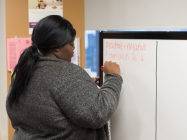“What are you an expert at?” Corinne Janet and Andrea Davis posed this question to the attendees of the “Women & Leadership: Rising Above Barriers and Bias” seminar.
Answers ranged from cooking and painting to speaking multiple languages. At the heart of this leadership workshop was the push for women to begin owning their successes and speaking about them unabashedly.
The “Women & Leadership: Rising Above Barriers and Bias” program is part of the Women + Leadership experience, an ongoing initiative for women-identified leaders to “identify opportunities to engage, connect, and network with other campus leaders” as well as creating a personally meaningful campus leadership experience, according to the program website. The program was put on by Student Life’s Leadership Programs, Women Involved in Learning and Leadership and the Women’s Center.
The seminar was held in the Women’s Center as attendees sat in a circle on overstuffed couches and fluffy poufs. It was led by Janet, the Coordinator of Student Life for Leadership, and Davis, a senior majoring in sociology and africana studies, a Civic Engagement and Leadership intern and president of the Student Events Board. They asked each attendee to introduce themselves and invited everyone to participate in the discussion. This was as much a conversation about the unique challenges faced by women in leadership roles as it was an informational seminar.
“We[‘re] talk[ing] about the particular challenges that college women face in leadership as well as address[ing] some possible solutions we can work toward as a community to support one another,” said Janet.
Attendees broke off into small groups to discuss the benefits of holding leadership roles on campus, such as having a better understanding of the community and being able to affect change on campus. However, the conversation quickly turned to the struggles of being female in a position of leadership.
Davis succinctly questioned: “How do I [lead and] not seem like a bitch or too commanding?”
Other struggles included dealing with co-workers who assume that women will do the behind-the-scenes labor like planning events and sending emails, without receiving credit for their work. Imposter syndrome, in which individuals cannot internalize their own achievements, was also common. Women reported feeling like a fraud in their job and attributing successes to good luck instead of hard work.
Women also mentioned the struggle of the burden of effortless perfection. Janet and Davis led a popcorn reading of an article titled “Never Let Them See You Sweat: The Myth of Effortless Perfection” by Amy Yao.
“I feel like I need to have it all together all the time,” says Janet. “Hair, lipstick … I need to make it look seamless.”
Participants discussed that women not only need to consistently perform at a high level, they have to make it look easy for fear of judgement by peers and other women. Organizers also emphasized that women are judged more harshly for mistakes and expected to be constantly ‘on’ to not only excel in the workplace, but fulfill the societal expectations of women.
“Relearning [these] ingrained lessons [about gender and expectations] are really hard,” says Janet.
“Women feel like they’re representing the whole gender,” says Jess Myers, the Director of the Women’s Center.
Being a female leader is also a complex issue that not only deals with gender but intersects with sexuality, race and class as well.
Zhihong Pang, a freshman biology major, admitted that he was attending the workshop as part of an assignment for his first year seminar class, but that he realized that it’s really valuable information to be aware of.
At the end of the discussion, Janet and Davis provided some insight into ways that women-identified leaders can grow and challenge the obstacles.
Finding a mentor and a sponsor can be especially helpful. A mentor is a person who supports and encourages, while a sponsor is someone who connects leaders with opportunities. Mentors and sponsors can help women reach their goals by emboldening them to embrace and expound upon their achievements.
“Women aren’t delivering the message of their greatness,” says Davis.

